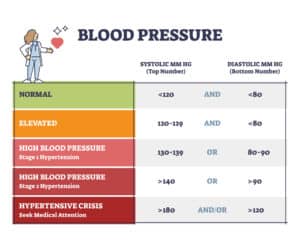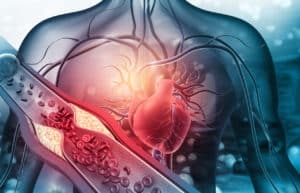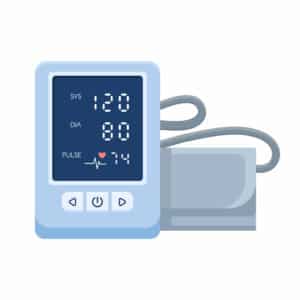 Blood pressure refers to the force of blood moving inside your arteries. Your arteries are the conduit that carries blood from your heart throughout your body. Every time your heart beats, blood gets pumped into the arteries, allowing them to deliver the nutrients and oxygen your body needs to function properly.
Blood pressure refers to the force of blood moving inside your arteries. Your arteries are the conduit that carries blood from your heart throughout your body. Every time your heart beats, blood gets pumped into the arteries, allowing them to deliver the nutrients and oxygen your body needs to function properly.
Your blood pressure reading is a measurement of how powerfully your blood is traveling through your arteries and blood vessels. This force fluctuates throughout the day based on what you’re doing at the moment. If you’re engaged in physical activity or feeling excited, your blood pressure will rise. When you’re performing more sedentary activities or are resting, your blood pressure will lower.
Both your heart and your arteries play an important role in your blood pressure. Your heart contracts each time it beats, creating maximum pressure as your blood is pumped out into your arteries. However, the elastic nature of your arteries are equally critical to your ability to maintain proper blood flow throughout the body. If your arteries become narrowed or blocked, it will impact the flow of blood to your organs, increasing your risk of dangerous health conditions.
Learn more about blood pressure:
How Is Blood Pressure Measured?
Blood pressure is measured by two figures:
- Systolic Blood Pressure – This figure measures the pressure in your arteries when your heart beats
- Diastolic Blood Pressure – This figure measures the pressure in your arteries when your heart is at rest between beats
These numbers are reported in the following way: systolic/diastolic. For example, if your blood pressure is “120 over 80” (or “120/80”), it means your systolic blood pressure is 120 mm Hg and your diastolic blood pressure is 80 mm Hg.
What Is Normal Blood Pressure?
The American Heart Association has identified five different blood pressure ranges:
 Normal – Any blood pressure number below 120/80 mm Hg is considered to be in the normal range.
Normal – Any blood pressure number below 120/80 mm Hg is considered to be in the normal range.- Elevated – Blood pressure that contains a systolic measure between 120-129 mm Hg and a diastolic measure below 80 mm Hg is considered to be elevated. Individuals with elevated blood pressure are at risk of developing high blood pressure, and they need to make lifestyle changes to help restore a figure in the normal range.
- Hypertension Stage 1 – Blood pressure that contains a systolic measure between 130-139 mm Hg or a diastolic measure between 80-89 mm Hg is considered to be hypertension stage 1. This is the earliest stage of high blood pressure. Lifestyle changes are required and in some instances, medication may also be prescribed to help manage the condition.
- Hypertension Stage 2 – A blood pressure number of 140/90 mm Hg or higher is considered by be hypertension stage 2. This more advanced stage of high blood pressure generally requires medication in addition to lifestyle changes to manage the condition.
- Hypertensive Crisis – Blood pressure numbers exceeding 180/120 mm Hg are considered to be a hypertensive crisis. This is the most severe form of high blood pressure and is considered a medical emergency. In this situation, you will need to receive medical attention right away.
What Is High Blood Pressure?
High blood pressure is a condition that occurs when your blood pressure numbers are consistently above the elevated blood pressure range. Roughly 50% of American adults suffer from high blood pressure. It is considered a “silent killer” because in most instances, there are no symptoms associated with the condition. For this reason, many individuals don’t even know they suffer from high blood pressure and as a result, experience significant organ damage before they become aware that something is wrong.
There are two main types of high blood pressure:
- Primary High Blood Pressure – This is the most common form of high blood pressure, and it develops over time as part of the aging process.
- Secondary High Blood Pressure – This form of high blood pressure is caused by another medical condition or the consumption of certain medications. It often goes away once the medical condition is treated or you discontinue the medications causing the issue.
High Blood Pressure Threatens Your Health
 When your blood pressure remains high for an extended period of time, your heart must pump harder to deliver blood to the rest of your body. If left untreated, it can result in a variety of serious health conditions, including:
When your blood pressure remains high for an extended period of time, your heart must pump harder to deliver blood to the rest of your body. If left untreated, it can result in a variety of serious health conditions, including:
- Heart attack – High blood pressure can damage and block your arteries, preventing proper blood flow back to the heart.
- Heart failure – High blood pressure forces your heart to work harder. This may cause it to become enlarged and stop supplying blood to your organs.
- Stroke – High blood pressure can cause blood vessels servicing the brain to burst or become blocked.
- Aneurysm – High blood pressure can cause blood vessels to bulge and become weak, resulting in an aneurism. If an aneurism ruptures, it can potentially be fatal.
- Angina – Chest pain (angina) is a common symptom of heart disease, which often develops due to high blood pressure.
- Kidney disease or failure – The arteries near your kidneys may become damaged due to high blood pressure, impacting their ability to effectively filter your blood.
- Brain problems – High blood pressure has been linked to reduced cognitive function and dementia later in life.
- Metabolic syndrome – High blood pressure can cause a variety of disorders impacting your metabolism. These disorders are typically associated with an irregular breakdown of sugar and may cause increased waist size, high blood sugar levels, decreased high-density lipoprotein (“good”) cholesterol, and high triglycerides.
- Peripheral artery disease (PAD) – High blood pressure can cause the arteries in the arms, legs, head and stomach to become narrowed, resulting in pain and fatigue.
- Vision loss – The blood vessels in your eyes may become damaged due to high blood pressure, resulting in vision loss.
- Sexual dysfunction – High blood pressure is a cause of erectile dysfunction in men and reduced libido in women. While this isn’t a health hazard, it can result in decreased quality of life.
High Blood Pressure Risk Factors
The following factors may increase your risk of high blood pressure:
- Family history of high blood pressure, diabetes or cardiovascular disease
- Over age 60
- Obesity
- High cholesterol
- Diabetes
- Use of oral contraceptives
- Lack of exercise
- Use of tobacco products
- High salt diet
- Excessive alcohol consumption
- Untreated sleep apnea
Tips for Managing High Blood Pressure
 While there’s no cure for primary high blood pressure, you can effectively manage the condition with a combination of lifestyle changes and medication. When you’re able to get your high blood pressure under control, it will improve your quality of life and reduce your risk of the serious health issues discussed above.
While there’s no cure for primary high blood pressure, you can effectively manage the condition with a combination of lifestyle changes and medication. When you’re able to get your high blood pressure under control, it will improve your quality of life and reduce your risk of the serious health issues discussed above.
Know Your Blood Pressure Numbers
The first step in managing high blood pressure is to monitor your blood pressure on a regular basis. When you know your numbers, you’re able to more easily detect patterns and identify changes as they occur. In addition, tracking your blood pressure over time will help you determine whether the lifestyle changes you’ve made are having a positive impact.
Make Lifestyle Changes
Managing your blood pressure will become a lifelong commitment. It’s important to adopt a heart-healthy lifestyle. Changes you should make include:
- Exercise regularly (at least 150 minutes of physical activity every week)
- Quit smoking
- Eat a heart-healthy, well-balanced diet that is low in salt
- Reduce alcohol consumption
- Maintain a healthy body weight
- Manage stress
Take Blood Pressure Medication as Directed
In many instances, medication may be an important component of your high blood pressure treatment plan. The following tips will help ensure your blood pressure medication delivers maximum impact:
- Take all medication exactly as prescribed, and don’t ever miss a day (decreasing your dosage or missing a dosage may cause your blood pressure to rise to dangerous levels)
- Work closely with your doctor to ensure your medication is achieving its intended outcome
- Avoid naturopathic approaches as a supplement to your medication, as these treatments may potentially interfere with your blood pressure medication
- Discuss any other prescription and over-the-counter medications you take with your doctor to ensure they won’t raise your blood pressure and/or impact the effectiveness of your blood pressure medication
- Be patient, as it can often take time to find the right dosage and/or combination of medications to effectively manage your blood pressure
- Alert your doctor of any side effects you experience
- If you’re working with more than one doctor (i.e., a primary care doctor and a specialist), make sure each doctor knows what your other physicians have prescribed
- Never stop taking your medication without consulting your doctor, even if you’re feeling fine and have seen your blood pressure numbers settle back into the normal range
South Denver Cardiology Associates Can Help You Manage Your High Blood Pressure
South Denver Cardiology Associates offers comprehensive services that can help you improve your heart health and effectively manage high blood pressure. These include:
- Diagnostic testing that can help you better understand your risk of cardiovascular disease and identify any potential issues before they become serious
- Pulmonary Hypertension Center that provides treatments and therapies to address this specific high blood pressure condition
- Nutritional counseling to help you lose weight and eat a heart-healthy diet
- Medical fitness gym to help you establish an exercise program that will make it easier to manage your high blood pressure
Contact us today to schedule an appointment.


 Blood pressure refers to the force of blood moving inside your arteries. Your arteries are the conduit that carries blood from your heart throughout your body. Every time your heart beats, blood gets pumped into the arteries, allowing them to deliver the nutrients and oxygen your body needs to function properly.
Blood pressure refers to the force of blood moving inside your arteries. Your arteries are the conduit that carries blood from your heart throughout your body. Every time your heart beats, blood gets pumped into the arteries, allowing them to deliver the nutrients and oxygen your body needs to function properly. Normal – Any blood pressure number below 120/80 mm Hg is considered to be in the normal range.
Normal – Any blood pressure number below 120/80 mm Hg is considered to be in the normal range. When your blood pressure remains high for an extended period of time, your heart must pump harder to deliver blood to the rest of your body. If left untreated, it can result in a variety of serious health conditions, including:
When your blood pressure remains high for an extended period of time, your heart must pump harder to deliver blood to the rest of your body. If left untreated, it can result in a variety of serious health conditions, including: While there’s no cure for primary high blood pressure, you can effectively manage the condition with a combination of lifestyle changes and medication. When you’re able to get your high blood pressure under control, it will improve your quality of life and reduce your risk of the serious health issues discussed above.
While there’s no cure for primary high blood pressure, you can effectively manage the condition with a combination of lifestyle changes and medication. When you’re able to get your high blood pressure under control, it will improve your quality of life and reduce your risk of the serious health issues discussed above.